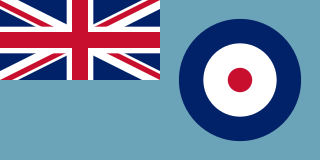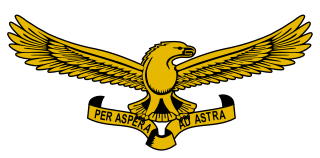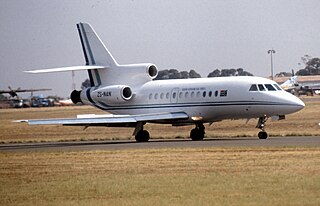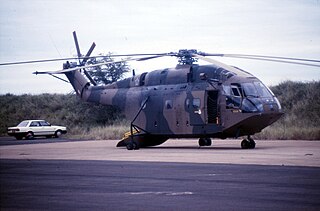
The Desert Air Force (DAF), also known chronologically as Air Headquarters Western Desert, Air Headquarters Libya, the Western Desert Air Force, and the First Tactical Air Force (1TAF), was an Allied tactical air force created from No. 204 Group RAF under RAF Middle East Command in North Africa in 1941 to provide close air support to the British Eighth Army against Axis forces. Throughout the Second World War, the DAF was made up of squadrons from the Royal Air Force (RAF), the South African Air Force (SAAF), the Royal Australian Air Force (RAAF), the United States Army Air Forces (USAAF) and other Allied air forces.

The South African Air Force (SAAF) is the air warfare branch of South African National Defence Force, with its headquarters in Pretoria. The South African Air Force was established on 1 February 1920. The Air Force has seen service in World War II and the Korean War. From 1966 the SAAF was involved in providing infantry support in a low intensity war in Angola, South-West Africa and Rhodesia. As the war progressed, the intensity of air operations increased until in the late 1980s, the SAAF were compelled to fly fighter missions against Angolan aircraft in order to maintain tactical air superiority. On conclusion of the Border War in 1990, aircraft numbers were severely reduced due to economic pressures as well as the cessation of hostilities with neighbouring states.

2 Squadron is a squadron in the South African Air Force which was formed in 1940. The squadron has a long history, having been involved in every single combat action in which the SAAF has taken part. During the Second World War it made a name for itself in the battles for East Africa, before distinguishing itself in North Africa as part of the Desert Air Force, and later in Italy.

21 Squadron SAAF is a squadron of the South African Air Force. It was formed as a bomber squadron in Kenya during World War II and became a VIP transport squadron in the 1960s, a role which it performs to this day. The squadron currently flies two Dassault Falcon 50s, two Cessna Citation Is, a Dassault Falcon 900 and a Boeing BBJ aircraft. 21 Squadron is one of the most active squadrons in the air force with 606 VIP transport flights being made between 2009 and 2012. The Boeing BBJ is used as the presidential aircraft when the President of South Africa travels.

22 Squadron is a squadron of the South African Air Force. It is currently a maritime helicopter squadron operating Lynx and Oryx helicopters for the South African Navy. Originally formed in 1942, the squadron is the only current maritime helicopter squadron of the SAAF. It has been involved with many rescues, some gaining international attention as well as arctic base support.

41 Squadron is a light transport squadron of the South African Air Force. It was formed in 1940, it is currently based at AFB Waterkloof.

85 Combat Flying School is a unit of the South African Air Force (SAAF). It is a jet flight-training and combat operations school, it was first formed in 1982 at AFB Pietersburg. It relocated to AFB Hoedspruit on 1 January 1993 due to the closure of AFB Pietersburg. The school also has a wartime reserve role, although it has publicly been stated that the school will not be used operationally unless a very urgent need arises.

The Aermacchi AM.3 was the result of a joint venture between Aermacchi and Aeritalia in response to an Italian Army requirement for an aircraft to replace the Cessna L-19, and was initially designated the MB-335.

1 Squadron SAAF was an air force squadron of the South African Air Force and was formed at Air Force Station Swartkop in February 1920, equipped with De Havilland DH.9's part of the Imperial Gift donation to South Africa by Britain. On 31 August 1939 the squadron was re-designated as 1 Bomber/Fighter Squadron and this was then changed to 11 (Bomber) Squadron in December 1939. The squadron was resurrected in February 1940 by the renumbering of 6 Squadron, equipped with four Hurricane Mk 1's and six Furies.

Air Force Base Ysterplaat is an airbase of the South African Air Force. It is located in Cape Town suburb Ysterplaat, on the southwestern coast of South Africa. The name Ysterplaat is Afrikaans from the Dutch "Ijzerplaats" meaning "Iron Place" or "Place of Iron" in English.

AFB Durban is an airbase of the South African Air Force, located in Durban, KwaZulu-Natal, South Africa. The runway is shared with the Durban International Airport. The airbase is at the northern end of the runway.

101 Squadron is a reserve squadron of the South African Air Force. Its main area of responsibility is Mpumalanga Province in the role of crime prevention. The squadron is based at AFB Hoedspruit. These reserve squadrons are used to fill a pilot and aircraft gap within the SAAF by making use of civilian pilots and their privately owned aircraft. Most flying takes place over weekends and because pilots have a good knowledge of the local terrain in the area where they live and commonly fly, the squadron is used mostly in the crime prevention role.

102 Squadron is a reserve squadron of the South African Air Force. The squadron area of responsibility is from north of Polokwane (Pietersburg) to the Limpopo River and is used for reconnaissance flights along the South African and Zimbabwe and Botswana borders. The squadron is based at AFB Makhado in Louis Trichardt. These reserve squadrons are used to fill a pilot and aircraft gap within the SAAF by making use of civilian pilots and their privately owned aircraft. Most flying takes place over weekends and because pilots have a good knowledge of the local terrain in the area where they live and commonly fly, the squadron is used mostly in the reconnaissance and crime prevention role.

104 Squadron is a reserve squadron of the South African Air Force. This squadron is used mostly in the VIP/IP transport role as well as reconnaissance flights in the Gauteng area. The squadron is based at AFB Waterkloof. These reserve squadrons are used to fill a pilot and aircraft gap within the SAAF by making use of civilian pilots and their privately owned aircraft. Most flying takes place over weekends and because pilots have a good knowledge of the local terrain in the area where they live and commonly fly, the squadron is also often used in a crime prevention role.

31 Squadron was initially a World War II Coastal bomber/reconnaissance squadron South African Air Force. It was later converted to a heavy bomber squadron that operated from bases in the Mediterranean from January 1944 until the end of the war. On conclusion of hostilities, the squadron was used to ferry liberated POW's from Italy back to Britain and disbanded South African troops from Italy to Egypt. It was disbanded on 15 December 1945. It was resurrected as a medium and light helicopter squadron in 1982 and operated from AFB Hoedspruit until its final disbandment on 4 December 1992.

30 Squadron SAAF was a squadron of the South African Air Force. It was established in 1944 and saw service as a medium bomber squadron in Italy during the Second World War. After the war, the squadron was disbanded and was resurrected in 1980 as a medium transport helicopter squadron – a role it retained until it was finally disbanded in 1991.
The History of the South African Air Force spans the First World War, Rand Rebellion of 1922, the Second World War, the Korean War, the South African Border War, and varied peacekeeping operations since 1994. Its battle honours include German South West Africa 1914–15, German East Africa 1915–1918, East Africa: 1939–1941, Middle East: 1941–43, Madagascar 1942, Italy 1943–1945, the Balkans 1943–1945, and Korea 1950–1953.

42 Squadron SAAF is a disbanded squadron of the South African Air Force, active from 1945 to 2000. The squadron's main role was to spot enemy artillery. The unit was formed in 1945 as 42 AOP Flight, flying Austers under command of an officer of the SA Artillery and was the only army aviation unit flying for South African forces during World War II.

The Air Force Mobile Deployment Wing (AFMDW) is a radar and communications wing of the South African Air Force. It provides combat ready, integrated and deployable air support capabilities. It appears to have sprung from the remnants of Airspace Control Command SAAF, which up until the late 1980s provided radar and warning functions. From the early 1950s, 1, 2, and 3 Satellite Radar Stations were formed at Mariepskop, Ellisras, and Mafiking, along with 70 Mobile Radar Group.

Operation Vanity was a Rhodesian military operation in Angola with clandestine assistance from the South African Air Force (SAAF) during the Rhodesian Bush War. The Rhodesian Air Force planned a retaliatory raid against a ZIPRA camp in Angola after a second Air Rhodesia Viscount was shot down on 12 February 1979.



















